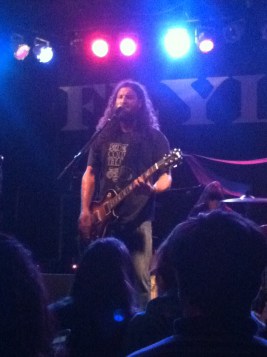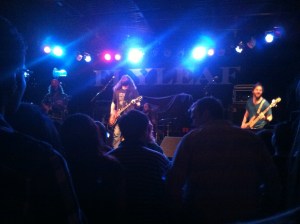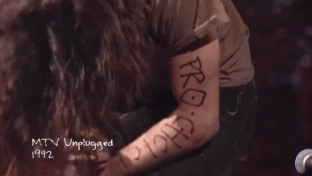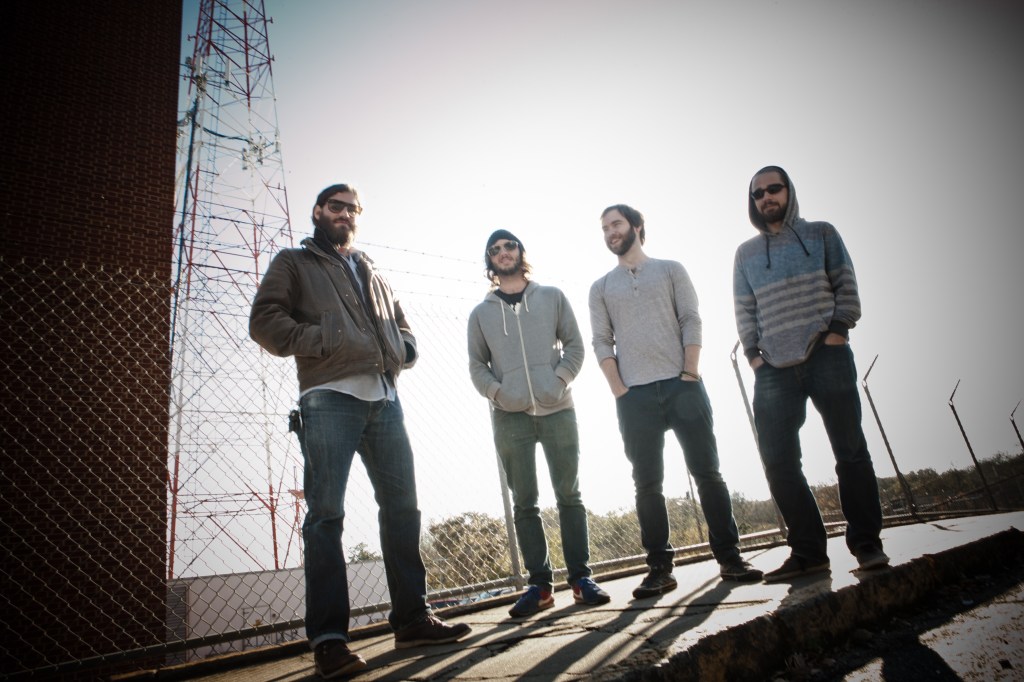
Gene Simmons may have said that rock music is dead, but Lullwater, an alternative rock band from Athens, GA, is intent on keeping the genre very much alive. Lullwater formed in 2007 and has performed with their current lineup since 2012, consisting of John Strickland (lead vocals/rhythm guitar), Brett Strickland (lead guitar/vocals), Roy “Ray” Beatty (bass guitar/backing vocals), and Joe Wilson (drums). Lullwater’s self-titled album, released on September 17, 2013, pays homage to the grunge bands of the early 1990s who influenced their sound. Recorded on tape at London Bridge Studios in Seattle, WA and produced by Jonathan Plum, the album contains thirteen raw, energetic tracks that showcase Lullwater as a definite act to watch.
I had the pleasure of interviewing Lullwater before their October 11, 2014 show at The Cat’s Cradle in Carrboro, NC while on tour with Flyleaf and Ryan White.
Tori: You’re two weeks into your tour. How has the experience been so far?
Brett: It took us two full days of driving to get to Texas, but it was totally worth it. The Texas shows were packed, and it’s great because we want to just play in front of as many people as possible. Their fans are really engaged and open to new music like us. They’ve been really digging it and it’s been awesome. We couldn’t have asked for more than that.

John: The venues, too. We’re playing a lot of venues that we haven’t played in the past so it’s really cool to branch out and play the rooms that we wanted to play, and to really get a good feel off the crowd. The crowds have been super supportive. After the show’s done and we’re at the merch table, their compliments are great and they’re like, “We’ve never heard of you guys,” and “Where have you been?” and that makes us feel great. It’s really comforting to know that what we’re doing is progressive and we can see it. We couldn’t be happier.
Joe: The Flyleaf camp are humble; nicest people we’ve ever met. They’re really a good, tight-knit group of people and were completely welcoming to us from the first day. Usually that first day can be a little weird – you know, you’re going to be with these people for six weeks – but they’ve been nothing but cool with us. We’re thankful for it.
Tori: That’s great. Have there been any funny or unexpected moments on tour? Anything that stands out?
Joe: Not yet! We’ve been so busy. This is definitely the biggest tour we’ve done and the workload is definitely bigger. We’ve had to be on our toes the whole time so we haven’t really had time to get into our normal antics.
John: It’s been crazy. Literally, we’d wake up in the morning in a gas station. We’d sleep at truck stops and wake up at nine-thirty, ten o’clock and drive, and right when we get in the venue, it’s work, work, work, work. We might have thirty minutes to an hour in-between soundchecks and the doors opening up. We’re on a skeleton crew right now. It’s just us four. We’re doing everything from TM [tour managing] – Joe’s TM-ing right now – Ray’s handling the merch, accounts, and everything else, so everybody has their own job within the band. We’re all working as hard as we can and then we play. It’s awesome. Then we’ll get offstage, hurry up, and go right back to the merch. (laughs) So, it’s like fifteen hours of work every single day.
Joe: We have two minutes to gather our thoughts after we play and we go straight to merch, and there’s usually people there just ready to hang out. (snaps fingers) We’re going.
Ray: It’s hectic and we get frazzled, but it’s the best kind of hectic. You know, when people say it’s good to be busy, it’s really the embodiment of that saying.
John: It really is!
Joe: And Tim [Geithman, the band’s manager] is usually out with us, but he had meetings and things to do so he’s handling the home front back in Athens, so it’s just all us out here for this tour. I think it’s a good thing. It’s made us get our own act together. It’s made us–
Brett: Really step up the responsibility.
John: Because before, we would go out on tour and it would just be a total drunkfest. I mean, all we had to do was play music, pretty much, and we had to set up merch here and there, but there was nothing to do other than just booze. And really, (laughs) that’s true. And this one, we’re not as fucked up as we normally are all the time. So it’s kind of nice, honestly. I feel way better on this tour than I’ve ever felt on a rock and roll tour we’ve done before.
Tori: Do you think that’s helped make you better musicians; just having that responsibility?

Joe: Well, we’ve always had a rule that we’d never play drunk.
John: Yeah, we don’t get hammered and play.
Joe: Usually, we’d play and be done, so we’d have time to go grab a beer and many more after that. But on this tour, it’s been so crazy that we haven’t had time to do that, which is great. I think we’re playing better because we know every night’s going to be like that. But yeah, we’re not getting tanked.
Brett: We’re trying to win over more fans, too, so we’ve got to really be on top of our stuff. We’ve come up with some cool stuff as far as improv, getting the crowd engaged, and they’ve been eating it up this tour so it’s been really awesome.
John: Also, I think we have more fun as a band when we are playing in front of 700 people. It’s a lot easier to create that – or to get into that vibe in that moment – when you’ve got 700 or however many people singing lyrics back to you, and everyone can feel that energy coming back to them. And for us, it’s easier to play and to be better and to push yourself when you do have that type of audience, and you know that these people are really enjoying what you’ve created and what you’re putting out there. For us as musicians, that’s the coolest feeling in the world. So we’re definitely living the dream right now, and we’re working as hard as we possibly can to keep going with it.
Tori: Coming off of your last album, Silhouette, what do you think has been the biggest change between that album and your self-titled release?
Joe: How do you know about Silhouette?
John: (laughs) We tried to bury that one. I don’t know how you– you were doing some digging.
Tori: I won’t tell anyone! (laughs)
Brett: With this new one, we have Joe, so that really solidified the sound we were going for. Everyone was on different pages when we were doing Silhouette and we were still new to everything as a band.
Ray: I had just joined the band and they already had most of the songs written for that, too. We just had to go into the studio and hammer out some songs and stuff.
John: It wasn’t a band. I think the biggest difference between the self-titled record and Silhouette is we weren’t a band. We were four individual musicians just kind of figuring our way around these songs and trying to make something happen when we didn’t have the chemistry first, and I think that’s where we screwed up in the beginning. We didn’t learn each other and we didn’t really mesh with each other yet. As a band, to make a great record, in my opinion, you have to be totally synced up. You have to solidify your sound, and I think with Seattle in the self-titled record, we found it. It was a magical thing for us to find that “click” and that bond between all of us where it was natural. It was a natural record because we were playing from knowing each other and playing those songs for, how many times? We toured on those new songs for a year, maybe, before we went in the studio, so we had it down.
Ray: I don’t think we toured at all before Silhouette.
John: No. We didn’t tour at all before Silhouette.
Ray: Touring really changed everything, too. It’s what makes a great spin.

John: And now that I mention the Seattle record – our self-titled record – it was done in London Bridge Studios, which is an awesome studio. We walked in the first day and it was just like the Wayne’s World moment. I’m not worthy ’cause we walk in and Pearl Jam Ten is looking at me right in the face and it blew my mind. Knowing you have that kind of pressure and the history that’s in the room, you step your game up like that. (snaps fingers) I mean, the pressure and the intensity while you’re recording… everything has to be so tight, and I think we put that on ourselves. We wanted to make the best record we possibly could, and we’re proud of it. We’re definitely proud of the new record.
Tori: I personally love it. I love the raw sound and how it feels like we’re really in the room with you guys. Did you have any reservations about putting out such a raw record in an industry that’s dominated by heavily processed music?
John: That’s exactly why we did it!
Brett: We are not down with that. If you look at the ’90s grunge movement and even the classics, you’re kind of going against the grain, and that’s what we are. There’s no gimmicks or crazy effects and all that stuff on our record. That’s not us. We’re as raw as can be. If you listen to it with headphones, you can hear other amps bleeding into the drum mics and little mess-ups here and there, but that’s real. If it’s too perfect, it’s not real.
John: It’s on tape. It’s a fat, warm, raw sound because you’re on analog tape and that room gave it a lot of personality. I think that London Bridge sound that it’s famous for… they created great records because what they harnessed in the ’90s, they still have, and they had with us, because it was raw. No bells and whistles, like Brett was saying. No gimmicks. It’s just four musicians playing in a room and it captured that. We’re not a polished rock band. Our whole thing is we’re loud, intense, sometimes sloppy, but we’re honest with ourselves, and I feel like that comes through when we’re playing live. There’s little inside jokes between everybody while we’re playing on the stage. Over years of playing together and playing those songs, there’s parts in those songs that bring us back to recording the record and the magic that we got there.
Ray: We don’t necessarily try to go against the grain to go against the grain. We just do what we do. It’s just what happens naturally. It’s the music we like and that we like to hear, so we make it.
Joe: It just happens to go against the grain.
John: It’s our own thing and I think we’ve been kind of jaded on things. We know what not to do. The story of Lullwater is we have figured out what not to do first. We’ve learned our lessons time and time again, and it’s gotten us to where we are now so we don’t make the same mistakes. I think trying to force ourselves into a mold or trying to be popular in a certain town or to [say] “This is what’s happening…” We couldn’t figure out why things were not going our way until we embraced that. Things started going our way when we said, “Screw everything else, this is just us. Let’s do our own thing and something will happen.” And it has. It’s been great. Sticking to our guns with not trying to fit into a mold has helped us in the long run.
 Joe: We don’t sit down and say, “We’re going to write a three-minute pop song and get it on the radio,” because it wouldn’t work with us. It wouldn’t work.
Joe: We don’t sit down and say, “We’re going to write a three-minute pop song and get it on the radio,” because it wouldn’t work with us. It wouldn’t work.
John: It wouldn’t feel real. I’d feel cheesy or… gross.
Ray: And we’d get stuck with performing that.
Joe: We’d feel like, “Ugh, what are we doing? We’re writing a pop song!” Ugh! We couldn’t do that.
John: I don’t ever want to do that.
Tori: I still don’t understand how an artist can go into the studio and make a record they had no hand in writing.
John: Money.
Joe: Money talks! About ninety percent of what you hear on the radio, like mainstream Top 40, those people didn’t write that music.
John: There’s a mold.
Joe: There’s a team of writers that are making millions of dollars because they have a formula – like how you write a paper for school and you have the outline that you have to go by – there’s a technique to write those pop songs. You ever heard one of those mashups where there’s ten different songs in the same flow? It’s because there’s a formula and that’s how the industry works. We’re trying to completely erase that.
John: That said, there are up-and-coming rock bands that are releasing records now, that you can tell they’re not buying into the same formula. Monster Truck is one. Crobot is another. I think we’re all getting tired of it. I know I am, and I know our band is so tired of being told what to listen to. This is rock. Rock is not polished. It’s not a formula. Rock and roll is against everything it has turned into, in my opinion. I’m a huge Dave Grohl fan. We’re all huge Foo Fighters fans and Pearl Jam, Nirvana. I’m pretty sure Kurt Cobain said, “Fuck you,” to everybody and that’s why he was one of the most influential writers and vocalists in the ’90s. They completely killed hair metal. Grunge, to me, was so powerful because as an adolescent, it was something so different, so new, and so aggressive that it pretty much stopped everything that was happening at the time. And I think rock will do that. I think rock will come back. It’ll never die. That Gene Simmons thing, “Rock is dead.” It’s not dead. It’ll never die because there are going to be musicians and people that have aggression, anger, angst, and all these things that rock music vents for people. It’s an outlet. It’s always been an outlet. It’s therapy for rock fans. I think once people embrace a new era of rock, it’s going to become like a bad dream for the pop rock stuff that’s out.

Joe: People are getting tricked pretty hard right now into what’s good.
John: I know we sound jaded and pissed off, but we kind of are.
Tori: I feel the same way.
John: I see you’ve got a Pearl Jam shirt on. That’s awesome.
Tori: They’re my favorite.
John: Me too. You think about Eddie Vedder, when he’s saying something, he’s giving you himself in his lyrics. He’s not talking about going to the strip club and taking a bunch of tequila shots and doing all this stupid stuff. He was in a dark place – or in a good place – but you know when you’re listening to Eddie Vedder sing, it’s genuine and it’s real. When you listen to Pearl Jam or Eddie Vedder, you get chill bumps because you know you just felt the moment that he was feeling. I don’t get chill bumps when some dude’s talking about going out tonight to the strip club or something.
Tori: Because there’s no substance. There’s no real meaning.
Joe: It’s watered down and dumbed down for the mass audience, and that’s sickening.
John: We’re in rock music and it’s not the most popular genre right now. There’s so many other popular genres. EDM’s huge, pop… Rock, now, is not as big as it was, so for us as up-and-coming musicians playing in the circuit, it’s hard. It’s hard to get people to come out and connect with you, but when you do, it’s awesome. I’d rather connect with fifty people than play in front of five thousand people who could give two shits about what we’re doing.

Tori: Going back to Pearl Jam, that actually leads into my next question. As a band, Pearl Jam has never been afraid to voice their political and social views. Do you guys want to do something like that? Are there messages that you hope listeners will take from your music?
John: I think it depends.
Joe: It’s slippery.
John: It is slippery, but I think if the time comes for it and that’s something that we really feel we need to address, I think we will. I don’t think we’ve ever been afraid to open up and be ourselves. With the new record, we were going through a lot of changes personally and internally. We weren’t connecting to the outside world. We were so focused on the struggle that we had in our own lives to where foreign affairs weren’t really touching us. It was the day in, day out, sleeping in truck stops, touring like crazy, and trying to be able to do this for a living, or at least break into something bigger than ourselves. During that record, it was a lot of emotional issues, relationship issues, struggles of being on the road, and going through a certain change in your life where you have to make decisions, and those decisions are going to affect the next five, six, seven years of your life. It was an intense time for us, and that’s what we focused on.
Tori: Getting into the music a little, there’s one line of “Albatross” that really stands out to me – “I’m an albatross, I sing despite you.” What does that mean for you guys? It seems like it’s directed at someone.
Joe: Oh, yeah. (laughs)
John: We’ve all got somebody to direct something like that towards. But yes, absolutely. It was directed at someone. A person. An institution.
Joe: A joke is what it was.
John: And that comes back to the struggles of being in a band and dealing with the music business. To be honest, it’s directed at the music business and how it preys on the weak and it preys on naive souls that are doing the best they can to do something they love, and you get fucked. That’s what we got pissed off about and we sang about. It’s the best therapy. That’s the thing about music. If you can’t release all your anxieties and aggression into music, then where can you? Some people go shoot guns and that’s cool, too, but we like to play rock and roll music!
Tori: I like the music idea better.
John: Us, too.
Tori: For me, that line [in “Albatross”] is significant because I had to really fight just to get guitar lessons as a kid. I was told, “Black people don’t play guitar,” and “Black people don’t listen to rock music.” When I play my guitar, I’m doing it in spite of all the people who told me I couldn’t. That’s what I think of every time I hear that line, so I wanted to ask you guys about it.
Joe: That’s awesome.
Brett: That’s badass.
John: That is so awesome. Thank you for sharing that. That’s really cool.
Tori: Sure thing. So, after this tour, what’s next for Lullwater?
John: Rehearsal. We’re going back in the studio next year. We’re trying to get the studio in January. Our management and PR are trying to put the puzzle pieces together and schedule everything out. We’ll get off the tour in mid-November. Thanksgiving’s coming up so we’re going to spend time with our families, and then December is rehearsal. We don’t know which one [studio] yet, but we’re going to try to get in January for another month, and hopefully have a record out in April. A full-length LP. In-between that, we’re going to be touring. We can’t stay at home for too long. We have to be out on the road. So we’ll probably be on tour early February, maybe? Mid-February? That’s what we’re working on.
Tori: Awesome. Just as a fun question, what are some things you could not go on tour without, other than yourselves and your instruments?
Joe: For Ray, it’d be technology.
Ray: Yeah, especially my phone. For all of us, our phones are our lifelines. We use it to deal with the business and talk to our people back home.
Joe: You’ve got to have wet wipes.
Brett: Clean pair of socks.
John: Definitely Gold Bond. Gold Bond is a must.
Brett: A lot of socks and boxers.
Joe: We normally wear the same jeans for a week and a half. You’ve got to stretch it until you can’t anymore.
John: The longest we went without showering was on last year’s tour. We went thirteen days. He [Brett] went fourteen.
Tori: Oh my goodness.
John: Once you have the film, though, it’s like a little bubble. Everybody else can notice it but you’re in a comfortable grease bubble. It’s weird. It’s gross, but you get used to it.
Tori: Hey, rock and roll. Is there anything else you would like to add?
John: Thank you for enjoying the record.
Joe: Support live music. Go see shows. There’s a lot of people out there that have a lot of good things to say and there’s a lot of good bands, but there’s a lot of people that won’t go out and see shows.
Brett: People don’t actively go to clubs to see bands – random bands they’ve never heard of – anymore. People used to go to venues just to see whoever was playing, and that’s how they discovered new music. People don’t really do that anymore. They’re there to see their friend’s band or whoever the headliner is. Then you have fans – like Flyleaf’s fans – that actually care about the openers, which is awesome. It’s a little more reassuring.
clubs to see bands – random bands they’ve never heard of – anymore. People used to go to venues just to see whoever was playing, and that’s how they discovered new music. People don’t really do that anymore. They’re there to see their friend’s band or whoever the headliner is. Then you have fans – like Flyleaf’s fans – that actually care about the openers, which is awesome. It’s a little more reassuring.
John: I think in the digital age now, everything is so instant gratification to where there’s no need to see a live show when you can go to YouTube and check it out. But to me, you’re missing everything. The whole point of going to a show is the community and the feeling. Some people go to church and that’s where they get their self-actualization and all these things that make them feel like a human being. For us, it’s going to live music shows. You can’t get it off the internet. It doesn’t matter how badass your sound system is or everything you’ve got set up. You will never get a feeling like going to a live concert. Period.
Joe: There’s a huge disconnect right now with that entire aspect and we’d like to see a change. I think there’s a lot of people that are ready for it to be like it was fifteen, twenty years ago. Even if you see a cool band and you’re like, “Man, I’ve got to see what that is.” People do not do that anymore.
Tori: That’s how the grunge movement was formed. It was a tight-knit group of people that went to each other’s shows and supported each other.
John: Yeah, like Pearl Jam Twenty, they were talking about when they had Stone Gossard and all those guys hanging around, that’s so cool to me. It’s hard to find that now. In Savannah, [Georgia] they all support each other and we support our friends’ bands in Athens, but it doesn’t feel like it necessarily grows into a bigger movement. Does that make sense? It feels like, “Oh, we’re just doing this ’cause we’re going to hang out.” We all support each other, but we wish people would hop on it. I think attitudes have changed, too. I was at a J. Roddy Walston show a year ago, and this girl in front of me was on her iPhone. She was doing her thing, trying to be cool. She looks over at her friend and she goes, “You know the J. Roddy show is next Tuesday,” and it blew my mind. We were at the J. Roddy show that Tuesday. She didn’t know what show she was at. She was just there because she was trying to be hip. So the music, in her mind, had no importance at all. It’s like, “Oh, I need to do this because this is what’s cool.” It pissed me off. Wow, I don’t where I went off on that. That was a tangent.
Joe: Yeah, our message is, “Go see live music!”
John: Go see live music and support the bands that you love, and they will give you everything they can back. And that’s it.
If you would like to learn more about Lullwater, you can visit the following links:
Official Website | Facebook | Twitter | YouTube | Instagram

